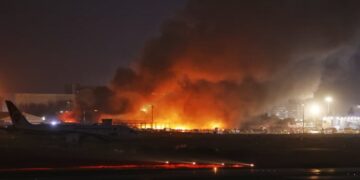The Tk 8,298 crore ‘Single Point Mooring with Double Pipeline (SPM) project was expected to revolutionize fuel transportation in Bangladesh. Yet, nearly a year after completion, it’s stuck in limbo due to unresolved issues over operations and maintenance that causing monthly losses in government revenue.
Key Features of the Project
-
Length: 110 kilometers (sea and land combined)
-
Pipeline Type: Double pipeline system is one for crude oil, one for diesel
-
Fuel Transport Capacity: 4.5 million tons of diesel and the same amount of crude oil annually
-
Reduced Transport Time: From 10–12 days down to just 48 hours
-
Annual Cost Savings: Estimated at Tk 800 crore
-
Direct Offloading from Large Ships: Eliminates need for small vessels, reducing handling loss and environmental risks
A Revolutionary Project on Pause
Bangladesh took a giant leap in its energy infrastructure with the Single Point Mooring with Double Pipeline (SPM) project. Costing a massive Tk 8,298 crore and backed by China, the project promised to reduce fuel transport time drastically, cut costs, and lower environmental risks.
The plan was simple but transformative and transport fuel directly from large tankers anchored 110 kilometers offshore in the Bay of Bengal straight to the Eastern Refinery in Patenga, Chattogram, bypassing the slow, traditional process involving smaller vessels.
However, nearly a year after the project was handed over to the Bangladesh Petroleum Corporation (BPC), this ambitious pipeline system lies unused, with key equipment deteriorating and no clear plan in place for operations and maintenance. This delay is costing the government hundreds of crores in lost revenue every month.
Progress Made So Far
The journey began in 2015 with project planning, aiming for completion by December 2018. However, construction delays and budget overruns pushed the cost to nearly double the original estimate. The Chinese firm China Petroleum Pipeline Engineering Co. completed construction and successfully commissioned the project in March 2023.
Two major trial runs tested the system:
-
Transporting 40,000 tons of crude oil from deep sea to Maheshkhali terminal
-
Piping 30,000 tons of diesel to the Eastern Refinery in Patenga
In August 2023, the project was officially handed over to BPC, marking what should have been the beginning of full operations.
Why the Project Remains Idle
Despite its successful commissioning, the SPM system hasn’t entered commercial operation. Here’s why:
1. No Operator Assigned
The Chinese company did not include operational management or maintenance in their project scope. Normally, such companies provide both services and training, but in this case, neither was done.
2. Delay in Appointing Maintenance Contractor
Initially, there was a plan to operate under a special provision of law using the previous contractors, but that law expired. As a result, a fresh tender was issued on April 30, 2025. The earliest a contract can be finalized is August, meaning operations may begin no earlier than November–December 2025.
3. Lack of Trained Local Personnel
No operational training was provided to local staff. So, even though the infrastructure is ready, Bangladesh lacks a trained workforce to manage the system safely and efficiently.
4. Equipment Deterioration
Valuable machinery is lying unused and exposed to corrosion, technical damage, and possible permanent dysfunction.
5. Revenue Loss
Due to inactivity, the government is losing hundreds of crores in potential revenue every month. What should have been a cost-saving innovation has become a fiscal burden.
Read More: Kaaktaal Signs Off After Four Beautiful Years of Sound and Soul
Official Statement
Engineer Masud Karim the General Manager (Planning & Development) of BPC, stated that-
“Despite completing commissioning over a year ago, commercial operation hasn’t started because the project didn’t define who would handle operations and maintenance. We’ve issued a new tender and expect that if things go according to plan, operations can begin by the end of this year.”
Economic Implications
-
The SPM pipeline can transport 90 lakh tons of fuel annually, while Bangladesh’s current refining capacity is just 15 lakh tons.
-
If operated fully, the pipeline could save over Tk 800 crore annually in logistics and handling costs.
-
Idle infrastructure and delays in execution mean both lost savings and lost revenue.
What Needs to Happen Next
-
Immediate Appointment of a Qualified Operator
-
Establish a Long-Term Maintenance Agreement
-
Train Local Staff to Run the System Independently
-
Conduct Routine Inspections to Prevent Equipment Damage
-
Hold Authorities Accountable for Delays and Mismanagement
Bangladesh took a bold step with the SPM project one that promised efficiency, cost reduction, and energy security. But mismanagement, legal lapses, and operational vagueness have rendered this game-changing infrastructure inactive. While the country struggles with fuel costs and energy dependency, a multi-billion taka solution sits idle.
If Bangladesh is to benefit from the ambitious SPM project, decisive administrative action and transparent management are urgently needed. Otherwise, what was meant to power the nation’s energy future may become just another example of squandered potential.
Share via:


















